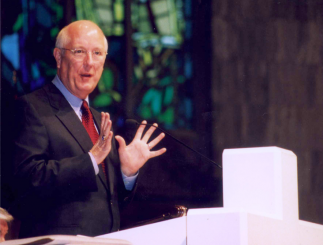By Editor Bob Terry
For Cleopas and his companion, the journey from Jerusalem to Emmaus must have been exhausting. Not that the 7-mile journey was physically taxing — it would have taken about three hours at an average pace — rather their bodies were drained of hope and energy before the trip ever started.
The two travelers were followers of Jesus of Nazareth. Some early traditions even say that Cleopas was the brother of Joseph, the foster father of Jesus. While that is uncertain, the story as related in Luke 24:13–35 tells us the two were closely associated with Jesus. That very day they had been with the disciples even though the disciples were keeping to themselves for fear of the Jews. The Emmaus-bound duo even knew the latest rumors circulating among the handful of Jesus-followers who had staked their lives on the ministry of this prophet from Nazareth.
In fact, both the weary travelers had placed their own hope in Jesus. “We had hoped that He was the One who was going to redeem Israel,” they told a stranger who joined them on the way.
But Jesus had been crucified. The chief priests and other Jewish leaders had conspired to have Jesus put to death by the Roman rulers. A week ago, Jesus had been cheered by thousands who had crowded Jerusalem for the Passover feast. It looked like Jesus might really be able to sieze power and restore Israel to its proper place in the world — the prestige known under King David.
Before the week was over many of those who cheered had been manipulated by the priests to call for Jesus’ execution. Jesus wasn’t the only thing that died on the cross that Friday. The hope of all Jesus’ followers died with Him. Their disappointment was so deep it almost killed their souls.
Almost. But on Sunday some of Jesus’ followers had gone to His grave and found the tomb empty. They said an angel told them Jesus was alive. In the back of their minds Cleopas and his friend remembered words about “the sign of Jonah” and about “rebuilding the temple in three days.”
The third day
And this was the third day. Surely if such a miracle occurred, Jesus would rise in glory and honor. He would show Himself publicly to atone for the public disgrace heaped upon Him on Friday. But so far Jesus had not shown Himself to anyone as far as the two travelers knew.
Yes it was a confusing time. The two talked about all that had happened trying to learn from one another, trying to understand more, trying to make sense out of the nonsense of the past days. The confusion, the disappointment, the grief left them “downcast” and everyone could see it.
To the stranger who approached, they summed up their predicament in one phrase — “We had hoped that He was the One who was going to redeem Israel.” Jesus was acknowledged as a prophet. He was popular with the people. His words penetrated the heart. His deeds demonstrated He was from God. He gave them reason to hope.
But now that reason was gone. When Jesus died on the cross hope disintegrated into chaos and confusion.
“But we had hoped.” How often that phrase sums up our confusion too. We had hoped to get the job. We had hoped for good test results. We had hoped for a good report from the doctor. We had hoped for a strong marriage. We had hoped for a successful ministry.
Like Cleopas and his friend, we often start with good reasons for high hopes only to be brought low by the bitterness of disappointment. Like Cleopas, we are often “downcast” by the confusion in which we live. Sometimes we feel alone as if forgotten by God.
The Emmaus-bound travelers hoped Jesus would redeem Israel. That is exactly what Jesus had done. But He had redeemed Israel in a way that Cleopas nor anyone else expected. The stranger chided the two. “Did not the Christ have to suffer these things and then enter His glory?” he asked. For the rest of the journey the stranger explained how the Scriptures foretold the death, resurrection and glorification of the One who would redeem Israel.
Later as the weary travelers began to share a meal with the stranger, they realized He was none other than Jesus of Nazareth, the One in whom they had hoped. Jesus had been their companion for miles but their confusion had prevented them from recognizing the risen Lord.
In the midst of confusion and disappointment it can be difficult to see God’s presence. Yet Jesus said, “I am with you always.” That covers every time, every place, every circumstance. His presence does not depend on our recognition. It depends on His promise.
God’s Word also promises that “in all things God works for good” (Rom. 8:28). God works to bring order out of our chaos, hope out of our failures and wholeness out of the fragments we create. Even when we cannot feel God’s presence because of the numbness caused by circumstances, God is at work.
Cleopas had to look backward with the new understanding provided by the stranger met on the road before he could see the presence of God in the terrible events of that past week. Sometimes we have to look back from the far side of our journey to see the golden thread of God’s grace at work in the midst of life’s confusions.
“But we had hoped” — whether these words are said by Cleopas or by us they signal confusion and disappointment. The best way to live in a confusing time is to look for the presence of the risen Lord and the “good” for which He is working.




Share with others: